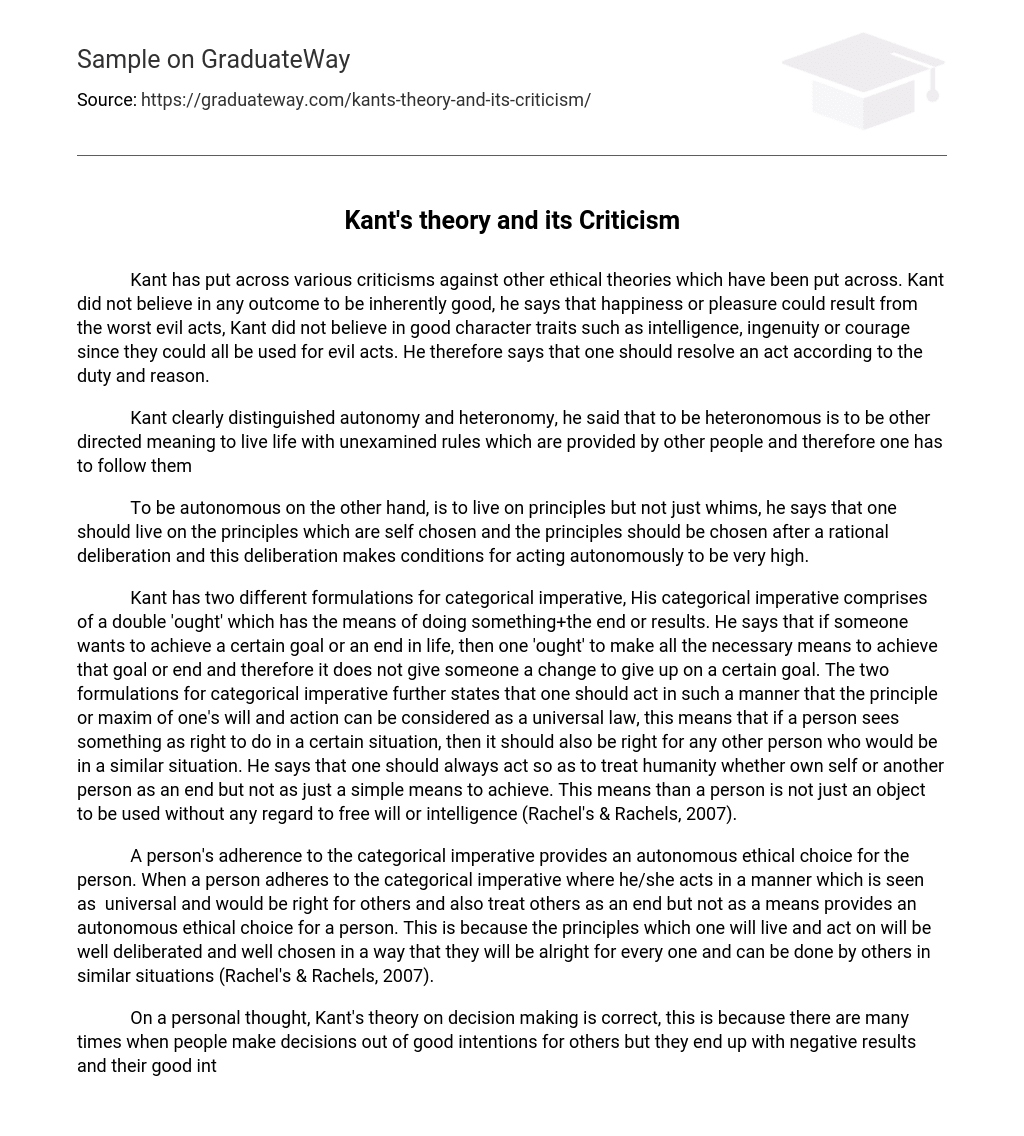Kant has put across various criticisms against other ethical theories which have been put across. Kant did not believe in any outcome to be inherently good, he says that happiness or pleasure could result from the worst evil acts, Kant did not believe in good character traits such as intelligence, ingenuity or courage since they could all be used for evil acts. He therefore says that one should resolve an act according to the duty and reason.
Kant clearly distinguished autonomy and heteronomy, he said that to be heteronomous is to be other directed meaning to live life with unexamined rules which are provided by other people and therefore one has to follow them
To be autonomous on the other hand, is to live on principles but not just whims, he says that one should live on the principles which are self chosen and the principles should be chosen after a rational deliberation and this deliberation makes conditions for acting autonomously to be very high.
Kant has two different formulations for categorical imperative, His categorical imperative comprises of a double ‘ought’ which has the means of doing something+the end or results. He says that if someone wants to achieve a certain goal or an end in life, then one ‘ought’ to make all the necessary means to achieve that goal or end and therefore it does not give someone a change to give up on a certain goal. The two formulations for categorical imperative further states that one should act in such a manner that the principle or maxim of one’s will and action can be considered as a universal law, this means that if a person sees something as right to do in a certain situation, then it should also be right for any other person who would be in a similar situation. He says that one should always act so as to treat humanity whether own self or another person as an end but not as just a simple means to achieve. This means than a person is not just an object to be used without any regard to free will or intelligence (Rachel’s & Rachels, 2007).
A person’s adherence to the categorical imperative provides an autonomous ethical choice for the person. When a person adheres to the categorical imperative where he/she acts in a manner which is seen as universal and would be right for others and also treat others as an end but not as a means provides an autonomous ethical choice for a person. This is because the principles which one will live and act on will be well deliberated and well chosen in a way that they will be alright for every one and can be done by others in similar situations (Rachel’s & Rachels, 2007).
On a personal thought, Kant’s theory on decision making is correct, this is because there are many times when people make decisions out of good intentions for others but they end up with negative results and their good intentions are no longer recognized. There are also other situations where people perform ethical decisions which end up bringing good results, Therefore people should base their ethical decisions on the situation at hand and apply the best decision they see right for the situation.
Kant believes that an outcome of an action is not relevant on whether it is ethical or not because bad actions sometimes lead to good consequences, he says that when one is making a moral decision, he/she should not make the decision out of kindness or compassion for others because there are situations where actions out of kindness lead to wrong acts and therefore he says that one should act according to what the reasoning dictates for that situation (Rachel’s & Rachels, 2007).
In conclusion, although Kant does not seem to give positive moral advice and see other theories such as utilitarianism giving us positive duties, they are are usually very difficult in practice so that we can know whether we are promoting the best consequences for our action. Kant gives people a strong sense of moral duty where one should ignore emotions, disregard outcomes of one’s action and do what is right.
Reference:
Rachels, J. & Rachels, S., (2007), the elements of moral philosophy, McGraw publishing, New York, ISBN: 0073125474





